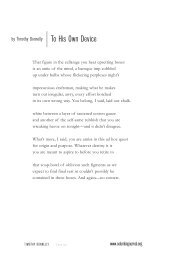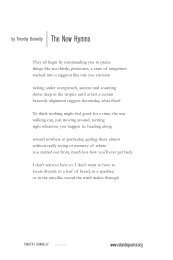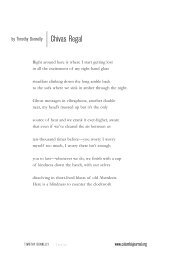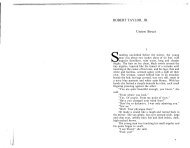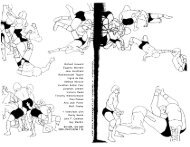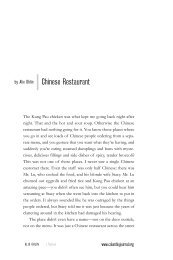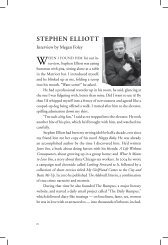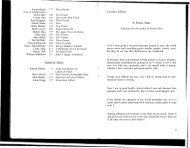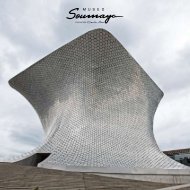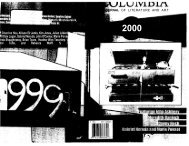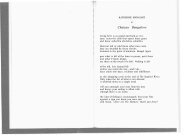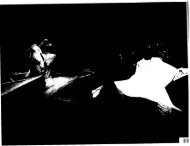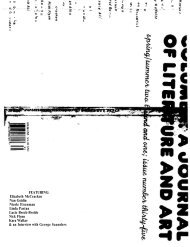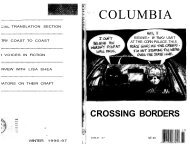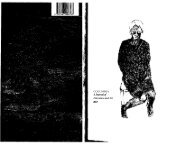Issue 42 - Columbia: A Journal of Literature and Art
Issue 42 - Columbia: A Journal of Literature and Art
Issue 42 - Columbia: A Journal of Literature and Art
Create successful ePaper yourself
Turn your PDF publications into a flip-book with our unique Google optimized e-Paper software.
giving him diuretics to get the fluid <strong>of</strong>f, <strong>and</strong> morphine for the pain<br />
<strong>and</strong> to help him breathe. But he is continuing to drown, his fingers<br />
<strong>and</strong> toes are turning blue, his blood is stagnating, he is on the verge <strong>of</strong><br />
collapse. We infuse a medicine to try to dissolve the blockage in the<br />
artery supplying his dying heart muscle. But this is also in vain.<br />
Nothing worked as planned. The pants man's circulation continued<br />
to fail; his lungs filled with more fluid as his extremities sank<br />
into a deeper violet. He would not live the night if we could not open<br />
that artery. He needed more than could be found in the slot. He<br />
needed someone to go in <strong>and</strong> manually unclog the blockage. He<br />
needed an angioplasty. So with a team <strong>of</strong> practioners in tow, we took<br />
our patient up to the fifth-floor <strong>and</strong> slowly woke up the cath lab from<br />
its weekend sleep.<br />
The cath lab was was nothing like being in medical school, where<br />
whenever I was gowned-up it was in an operating room, <strong>and</strong> I<br />
always felt out <strong>of</strong> place. Back then, I held retractors. I held them so<br />
long over open chests <strong>and</strong> abdomens that my neck cralnped <strong>and</strong> my<br />
shoulders ached. I tried to give as much exposure to the operating<br />
field as possible in the hope that I would disappear. I focused on trying<br />
to help as much as I could. Get this, do that, keep moving.<br />
Inevitably the chief surgeon would ask some mortifying question<br />
like, "What do you make <strong>of</strong> the mouse model <strong>of</strong> hernia repair?" or<br />
"What Shakespeare play does this line come from?" My inability to<br />
answer was crushing. There could never be any doubt about who<br />
wielded the power over me: the nurses, the other doctors, <strong>and</strong> the<br />
open body in that room.<br />
But that night in the cath lab, there were no impossible questions.<br />
It was just business as usual. As dye was injected, we took pictures.<br />
Pictures <strong>of</strong> the arteries <strong>and</strong> blockages, pictures <strong>of</strong> a small balloon<br />
blowing up inside an artery, <strong>and</strong> then the trickle <strong>of</strong> dye that said the<br />
blockage was gone. All <strong>of</strong> this recorded on what looked like old<br />
Super 8 film, a sort <strong>of</strong> home movie <strong>of</strong> the heart.<br />
When all was done that could be, <strong>and</strong> the catheters were<br />
removed, it was my job to make sure that the large hole we made in<br />
the femoral artery closed. This meant applying firm but constant<br />
pressure on my patient's groin. I thought this was going to be the<br />
final act, the triumphant denouement after the climactic angioplasty.<br />
We had opened up his artery, <strong>and</strong> restored blood-flow back into:,<br />
his heart, but the man was still dying. His heart muscle -like a '<br />
child gone limp after a beating - had been so stunned by the sudden<br />
<strong>and</strong> complete lack <strong>of</strong> oxygen that it would not contract. The<br />
pants man's eyes began to dull <strong>and</strong> blood tests showed a dangerow:<br />
buildup <strong>of</strong> acid.<br />
A last attempt was made to save him by putting in an intraaortic<br />
balloon pump, which actually did the trick. So after hours<br />
<strong>of</strong> effort using the best available high-technology interventional<br />
cardiology - something based on the physics <strong>of</strong> a party favor<br />
that would save this man.<br />
After what seemed like an eternity (but more like five hours), I<br />
brought the pants man, his IVs <strong>and</strong> balloon pump up into the cardiac<br />
ICU. He was stable; I was exhausted. By then I had spent hours<br />
pulling, poking, prodding, <strong>and</strong> probing his body. I had made hiln uri<br />
nate, thinned his blood, put my h<strong>and</strong>s in his groin. I was intimately<br />
aware <strong>of</strong> him, yet I knew very little about him. It was like I had been<br />
looking at the photographic negative <strong>of</strong> someone. Details, size, texture<br />
had all been perfectly represented, yet remained uninterpretable,<br />
It relninded me <strong>of</strong> my own father.<br />
When I was around my sons' ages, my father <strong>and</strong> I spent countless<br />
hours together. Not just at synagogue, but doing many <strong>of</strong> the usual<br />
father-son things available in a New York City suburb: mowing the<br />
lawn while straddling a wheelhorse tractor, pulling weeds from the<br />
garden at the front <strong>of</strong> the house, raking leaves, driving from place to<br />
place looking for shrubs or plants or more mulch. In the summers he<br />
wore ripped jeans <strong>and</strong> a white T-shirt. There are pictures <strong>of</strong> me on his<br />
shoulders as a young boy, but I cannot remember being there.<br />
What I do remember is his belly loosely hanging out over the rim<br />
<strong>of</strong> his jeans, <strong>and</strong> the embarrassment <strong>of</strong> seeing his jeans fall down as<br />
he bent over to plant seeds or bulbs. I can still see the patches <strong>of</strong><br />
psoriasis there <strong>and</strong> on his arms. The same patches that drove our<br />
family from open beaches to desolate s<strong>and</strong>y places where he could<br />
take <strong>of</strong>f his shirt in private.<br />
I was always aware <strong>of</strong> his psoriasis. I noticed how he never talked<br />
about it, how lny mother would say, "We can't go there because <strong>of</strong><br />
your father."<br />
I knew from quiet, careful surveillance that at night he wrapped<br />
himself in Saran Wrap after covering his skin in cremns to try to abatl<br />
the seemingly endless propagation <strong>of</strong> the thick plaques.<br />
When we worked in the garden, I could see how the medicine<br />
made his skin diaphanous in places. How cuts that on lne would be<br />
mere scrapes would, for him, be bleeding wounds. Though we spent<br />
many hours talking, we never spoke <strong>of</strong> this. We talked about soil <strong>and</strong><br />
dirt <strong>and</strong> rocks. We talked about water tables <strong>and</strong> the differences



